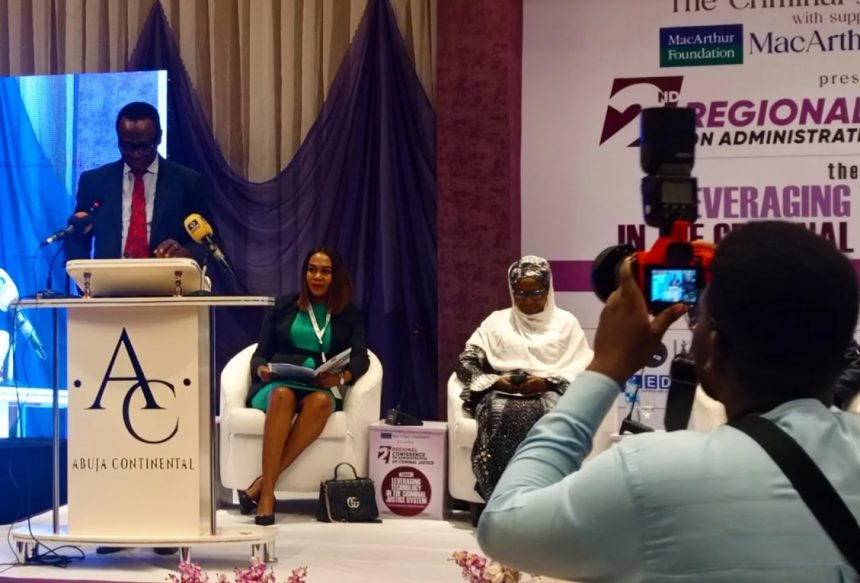Chief Justice of Nigeria (CJN) Kudirat Kekere-Ekun has called for an urgent overhaul of the country’s criminal justice system, emphasising the need for technological integration to address pervasive inefficiencies, extensive delays, and rampant corruption.
Speaking at the second regional conference on the administration of criminal justice on Monday in Abuja, Kekere-Ekun urged stakeholders to adopt innovative solutions such as digital case management systems, e-filing platforms, and virtual hearings.
“Technology, if effectively harnessed, offers a powerful tool for enhancing transparency, efficiency, and accessibility in the criminal justice process,” Kekere-Ekun said.
She cited the success of Lagos State’s Bail Management Information System, which automates bail processes through a web-based platform, as a model for broader implementation.
Additionally, she highlighted the potential of digital forensics, including the use of drones and CCTV, to provide crucial evidence in investigations.
Users of Nigeria’s criminal justice system and the court system generally face significant obstacles, including a backlog of cases, lengthy delays in court proceedings, and a pervasive culture of corruption.
Safeguarding judicial independence
While advocating for technological advancements, Ms Kekere-Ekun cautioned against potential threats to judicial independence.
“Judicial independence is the bedrock of a functional democracy,” she asserted, underscoring the need to protect digital platforms from cyber threats and unauthorised access.
“The less manual our systems are, the less vulnerable they are to corruption,” she added, calling for a judicial framework that empowers judges to make impartial decisions free from external influences.
Kekere-Ekun also acknowledged the barriers to implementing technology in Nigeria’s justice system, including inadequate digital infrastructure, insufficient training for judicial personnel, and budget constraints.
She called for comprehensive training programmes for judicial officers, court administrators, and law enforcement personnel to effectively utilise digital innovations.
Collaborative efforts and national initiatives
Kekere-Ekun commended the National Judicial Council (NJC) for its ongoing efforts to promote information and communication technology (ICT) within Nigerian courts.
Through its National Judicial Technology Policy, the NJC has outlined a framework for deploying digital tools, including case management software and electronic monitoring devices, aimed at streamlining court processes.
Echoing this call for modernisation, Letticia Ayoola-Daniel, Director of Justice Reforms at the Federal Ministry of Justice, delivered remarks on behalf of the Attorney General of the Federation and Minister of Justice Lateef Fagbemi.
She detailed initiatives designed to enhance transparency and efficiency within the legal system. Recent advancements include the establishment of federal courtrooms equipped with advanced ICT infrastructure and the launch of two virtual courtrooms at Kuje Correctional Centre to expedite judicial processes.
State-level innovations
Lagos and Borno states were recognised for their innovative approaches to integrating technology into judicial reforms.
Lagos has implemented a judiciary case management information system to enhance case tracking, while Borno is exploring the use of artificial intelligence to combat organised crime.
The Federal Ministry of Justice is also working towards a centralised justice sector information management system to facilitate real-time case tracking, ensuring compliance with the Administration of Criminal Justice Act (ACJA) of 2015.
Regional collaboration
During the conference, Gertrude Torkornoo, the Chief Justice of Ghana, represented by Ghanaian judge, Nana Akwaba, expressed optimism for enhanced judicial cooperation between Ghana and Nigeria.
She highlighted advancements in Ghana’s judiciary, including the implementation of digital court operations and virtual hearings, which aim to reduce human interaction in court processes.
“Technology is both a blessing and a challenge,” remarked Justice Akwaba, noting that these digitisation efforts have significantly reduced opportunities for corruption and accelerated justice delivery.
A shared commitment to reform
The conference, hosted by the Juritrust Centre for Socio-Legal Research and Documentation in collaboration with civil society organisations such as CLEEN, FIDA, ICPC, and LEDAP, runs from 21 to 23 October. Supported by the MacArthur Foundation, the event aims to explore how technological advancements can enhance the efficiency and accountability of Nigeria’s criminal justice system.
In his opening remarks, Adedeji Adekunle, a Senior Advocate of Nigeria (SAN) and chair of the Organising Committee, welcomed participants and emphasised the importance of integrating technology into the criminal justice framework.






